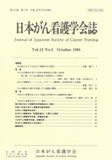Japanese
English
- 販売していません
- Abstract 文献概要
- 参考文献 Reference
- サイト内被引用 Cited by
要約
本研究は,乳がん体験者のソーシャル・サポートの実態を知ることとソーシャル・サポートと精神的・身体的状況との関連を探究することを目的として行われた.研究デザインは横断的研究である.研究対象者は某県立がんセンターの乳腺外来において経過観察中の者で,乳房切除術後6ヵ月以上5年以内の113人である.日本語版Norbeck Social Support Questionnaire,Interpersonal Relationship Inventory,General Health Questionnaireを使用しデータ収集を行った.これらのデータは,記述的統計,ピアソン積立相関係数,重回帰分析により分析された.分析結果は,婚姻状況とソーシャル・サポート変数である助力(r=.25;p<.01:r2=.06)とサポート量(3つのタイプのサポートの総和)との間に有意相関(r=.20;p<.05;r2=.04)があった.またソーシャル・サポートの一変数であるコンフリクトは,精神的状況と正の相関を示した(r=.30;p<.01;r2=.09).しかし,どのソーシャル・サポート変数とも身体的状況とは有意な相関がなかった.コンフリクト,トータルサポート,リシプロシティの3つのソーシャル・サポート変数は,精神的状況を有意に予測した(R=.3372:R2=.1137;F=4.2768:P=.0069).主なソーシャル・ネットワークは,家族,親戚,同病者も含めた友人であった.このような結果は,ソーシャル・サポートが乳がん体験を調整するための重要な一因子として考慮すべきであると示唆するものである.ソーシャル・サポート概念への再構築と臨床への活用について考察し,今後必要な研究について述べた.
Abstract
The purpose of this study was to describe social support among women with breast cancer and to investigate the relationship of social support, psychological, and physical states. A cross-sectional study was designed. A convenient sample of 113 women with breast cancer, who were no less than 6 months and no more than 5 years after breast surgery and who were receiving follow-up care at the Outpatient Breast Clinic at one cancer center, participated in the study. The Japanese versions of the Norbeck Social Support Questionnaire, the Interpersonal Relationship Inventory, and the 60- item General Health Questionnaire were used to obtain data. Descriptive statistics, Pearson correlations, and multiple regression analyses were performed. The analyses indicated there were positive correlations between marital status and social support variables, such as Aid (r=.25; p<.01; r2=.06) and Total Functional (r=.20; p<.05; r2=.04). Also, Conflict, one social support variable, had a positive correlation with psychological states (r=30; p<.01; r2=.09). However, there was no significant correlation between these social support variables and physical states. The set of social support variables(i.e. ,Conflict, Total Support, and Reciprocity)predicted psychological states (R=.3372; R2=.1137; F=4.2768; p=.0069). Moreover, their sources of social support were mainly family members, relatives, and friends, including other breast cancer patients. These significant correlations revealed that social support should be considered as an important factor to help women's adjustment to breast cancer. Reconsideration for concept of social support and recommendations for practice were discussed. Further research was proposed.
Copyright © 1998, Japanese Society of Cancer Nursing All rights reserved.


